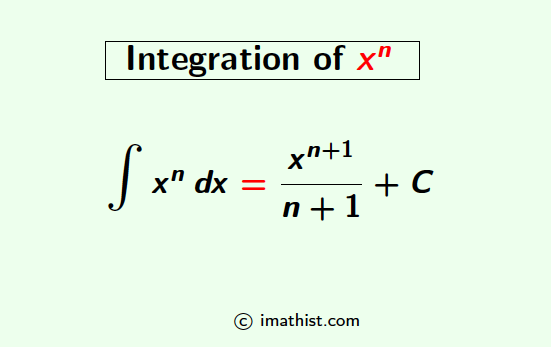The integration of xn is given as follows: ∫xndx = xn+1/(n+1) + C where C is an integration constant. In this post, we will learn how to find the integral of x to the power n.

Integration of xn Formula
The integration formula of xn (n-th power x) is given below:
∫xndx = xn+1/(n+1) + C
where C is an integral constant. This rule is called the power rule of integration.
Integration of xn Proof
We know that the derivative of xk is equal to kxk-1. Putting k=n+1 we get that
$\dfrac{d}{dx}(x^{n+1})=(n+1)x^n$ …(I)
As the integration (anti-derivative) is the inverse process of derivatives, integrating both sides of (I) we get that
$x^{n+1}=\int (n+1)x^n \ dx +C’$ where C‘ is an integral constant.
⇒ $x^{n+1}=(n+1) \int x^n \ dx +C’$ by the multiplied by constant rule of integration.
⇒ $\dfrac{x^{n+1}}{n+1}= \int x^n \ dx +\dfrac{C’}{n+1}$
⇒ $\int x^n \ dx=\dfrac{x^{n+1}}{n+1}+C$ where $C=-\dfrac{C’}{n+1}$
So the integration of x to the power n is equal to xn+1/(n+1)+C where C is an integration constant.
Few Examples,
- The integration of x is equal to $\int x \ dx = \dfrac{x^2}{2}+C$
- The integration of x2 (x square) is equal to $\int x^2 \ dx = \dfrac{x^3}{3}+C$
- The integration of x3 (x cube) is equal to $\int x^3 \ dx = \dfrac{x^4}{4}+C$
- But, using the above power rule of integration, we cannot find the integration of 1/x. This is because x-1+1/(-1+1), so we are getting 0 in the denominator. Hence, it does not exist. The integration of 1/x is equal to $\int \dfrac{1}{x} dx = \ln x+C$ where ln denotes the natural logarithm (that is, logarithm with base e).
ALSO READ:
FAQs
Q1: What is the integration of xn?
Answer: The integration of xn is equal to ∫xndx = xn+1/(n+1) + C.